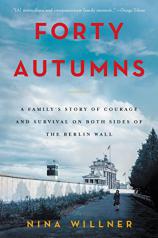Reading Group Guide
Discussion Questions
Forty Autumns: A Family's Story of Courage and Survival on Both Sides of the Berlin Wall

1. FORTY AUTUMNS weaves the author’s family’s history and that of East and West Germany following World War II and into the Cold War years. Why is it important to understand the two stories together?
2. When American troops evacuate Schwaneberg following World War II and the city falls under Soviet control, Oma has a heart-wrenching decision to make: whether to break up the family by sending some of her children to safety with the departing soldiers or keeping the family intact. In the end, she decides to send Hanna away. If you were Oma, what would you have done? What factors played into her decision to send Hanna and not the others?
3. After Hanna’s first escape attempt and subsequent return home to live with her parents, Opa treats her like a pariah. Do you think he really felt that way at the time? If not, what might his motives have been for acting so dismissive of her? How do you think Oma felt when Hanna returned?
4. After the Soviets take control of East Germany, Opa becomes the headmaster of the local school. Despite his lack of belief, he still agrees to teach a pro-communist curriculum for the good of his family. Do you think he made the right decision? Why or why not? Is it better to stay true to your beliefs even if it means putting yourself and loved ones in harm’s way?
5. Before 20-year-old Hanna escapes East Germany for good, she spends weeks “anguishing over whether to succumb to a stifling life in the East or make a run for it.” In the end, she decides to take the risk. What would you have done if you were in her shoes? Would you have had the courage to flee, knowing you might die or never see your family again?
6. Willner implies that Oma knew about Hanna’s true intentions the morning Hanna escaped. Why might she have said nothing? If you were Oma, would you have tried to stop your daughter? Why or why not?
7. In 1966 when Willner is in kindergarten, she finds out that her mother’s family is “trapped behind a curtain” in East Germany. At five years of age, she believes they are hiding behind an actual piece of cloth. Do you have children or grandchildren? If so, how do you explain complex subjects like war or disease to them? Is it better to spell out the truth in language they can understand or shield them from information that might harm or upset them?
8. What was the concept of the Family Wall? Why was the Family Wall so important to Oma? Beyond the literal meaning, what did having a garden and planting and harvesting mean to Oma?
9. Many years later, Heidi is faced with a similar decision: whether or not to join the communist party. She and her husband decide against it and, therefore, are turned down for many jobs. Who do you think made the smarter decision: Opa or Heidi? Or were circumstances different for Heidi by that time? Was it easier to remain on the fringes after she matured into adulthood?
10. What was the importance of Paradise Bungalow to Heidi and Reinhard? What was Reinhard and Heidi’s biggest achievement in building Paradise Bungalow?
11. Willner reports that the borders between East and West Germany were opened on November 9, 1989, due to a miscommunication. Were you surprised to find this out? What do you think might have happened if this mistake hadn’t occurred?
12. Were you surprised to find out that Willner’s family stayed in East Germany following the fall of the Berlin Wall?
13. Imagine you and your family had been living in East Germany during the Cold War and had just been given word that you were free to leave. Would you abandon your home, knowing it might evolve following a regime change? Why or why not? If so, where would you relocate?
14. Most of the Stasi evaded prosecution for their crimes following the fall of the Berlin Wall and the end of the Cold War. Should they be prosecuted? Or were they just doing their job by following orders? Are their actions any different from those of the Nazis before them?
15. Toward the end of Oma’s life, she reflects on what her family has been forced to endure in the face of world events. “We have survived East Germany with our dignity intact. This life has not always been easy, but it has not made us bend. It has actually made us stronger. And we are strong because our souls are free,” she says. What do you make of Oma’s quote? Do you think their souls are free? Why or why not?
16. How do you think the Willner family maintained their close connection during the Cold War even though they were separated by the Iron Curtain? What gave them the strength to survive the Communist regime?
17. Which character do you relate to the most in FORTY AUTUMNS? The least? Why?
18. Did reading FORTY AUTUMNS change your perspective of how the Cold War progressed? Is there room to see why the Soviet and East German leaders were so protective of the communist way of life? Why or why not? What can be gained by trying to understand a different point of view even if you disagree with it?
19. After the fall of East Germany, many former East Germans were astounded to learn the extent to which the secret police orchestrated a network of citizen informants. How do you think you would have fared living and working together with family, friends, classmates, colleagues, then being pressured to give the Stasi information to denounce them or be used against them? What would you have done if they threatened your family if you did not cooperate?
20. FORTY AUTUMNS is the story of a family torn apart by the Iron Curtain for more than 40 years. How do the politics in FORTY AUTUMNS resemble or differ from our current political situation? What do we have to learn from the Cold War that is applicable today?
Forty Autumns: A Family's Story of Courage and Survival on Both Sides of the Berlin Wall
- Publication Date: August 15, 2017
- Genres: Memoir, Nonfiction
- Paperback: 416 pages
- Publisher: William Morrow Paperbacks
- ISBN-10: 0062410326
- ISBN-13: 9780062410320








